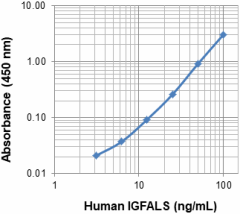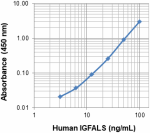- Clone
- M6001E07 (See other available formats)
- Regulatory Status
- RUO
- Other Names
- ACLSD, ALS, insulin-like growth factor binding protein, acid labile subunit
- Isotype
- Mouse IgG1, κ
- Ave. Rating
- Submit a Review
- Product Citations
- publications

| Cat # | Size | Price | Quantity Check Availability | Save | ||
|---|---|---|---|---|---|---|
| 537404 | 100 µg | $265 | ||||
The insulin-like growth factors (IGFs) are found in binary complexes with members of IGF-binding protein family (IGFBP-1 to -6). IGFALS is the acid-labile subunit of the IGF binding protein complex that forms ternary complexes with IGFs and IGFBP-3/IGFBP-5. IGFALS has no affinity for free IGFs and has a very low affinity for uncomplexed IGFBP-3/IGFBP-5, but readily binds to the IGFs and IGFBP-3/IGFBP-5 complex, which extends the serum half-lives of IGFs. IGFALS is mainly produced by the liver and is exclusively found in high concentration in postnatal serum. IGFALS production is predominantly stimulated by the growth hormone. Mutations in IGFALS causes ALS, amyotrophic lateral sclerosis, deficiency, which manifests itself as delayed and slow puberty. IGFALS mutations have also been associated with insulin resistance. Mature IGFALS protein is composed of 578 amino acids with 20 leucine-rich repeats. It shares 93% identity between mouse and rat, and 79% between mouse and human.
Product DetailsProduct Details
- Verified Reactivity
- Human
- Antibody Type
- Monoclonal
- Host Species
- Mouse
- Immunogen
- Recombinant protein
- Formulation
- Phosphate-buffered solution, pH 7.2, containing 0.09% sodium azide.
- Preparation
- The antibody was purified by affinity chromatography.
- Concentration
- 0.5 mg/ml
- Storage & Handling
- The antibody solution should be stored undiluted between 2°C and 8°C. Do not freeze.
- Application
-
ELISA Detection - Quality tested
- Recommended Usage
-
Each lot of this antibody is quality control tested by ELISA assay. For ELISA Detection applications, a concentration range of 0.5 - 4.0 µg/mL is recommended. To obtain a linear standard curve, serial dilutions of IGFALS recombinant protein ranging from 3.125 to 100 ng/mL is recommended for each ELISA plate. It is recommended that the reagent be titrated for optimal performance for each application.
- Application Notes
-
The biotinylated M6001E07 antibody is useful as the detection antibody in a sandwich ELISA assay, when used in conjunction with the purified M6005C04 antibody (Cat. No. 537302) as the capture antibody and Recombinant Human IGFALS (ELISA Std.) (Cat. No. 758809).
- Product Citations
-
- RRID
-
AB_2783349 (BioLegend Cat. No. 537404)
Antigen Details
- Distribution
-
Produced by the liver and is mainly found in the postnatal serum.
- Function
- IGFALS production is stimulated by growth hormone and is important for extending the serum half life of IGF.
- Interaction
- IGF-1/IGF-2 and IGFBP-3/IGFBP-5 binary complexes
- Ligand/Receptor
- IGF-1/IGF-2 and IGFBP-3/IGFBP-5 binary complexes
- Biology Area
- Angiogenesis, Apoptosis/Tumor Suppressors/Cell Death, Cancer Biomarkers, Cell Biology, Cell Cycle/DNA Replication, Cell Proliferation and Viability, Signal Transduction
- Molecular Family
- Carrier Proteins
- Antigen References
-
- Baxter RC, Dai J. 1994. Endocrinology. 134:848-852.
- Twigg SM, Baxter RC. 1998. J Biol Chem. 273(11):6074-9.
- Khosravi MJ, et al. 1997. J Clin Endocrinol Metab. 82:3944-3951.
- Domene HM, et al. 2004. New Eng J Med. 350:570-577.
- Domene HM, et al. 2005. J Endocrinol Invest. 28(5):43-6.
- Gene ID
- 3483 View all products for this Gene ID
- UniProt
- View information about IGFALS on UniProt.org
Related Pages & Pathways
Pages
Related FAQs
- How many biotin molecules are per antibody structure?
- We don't routinely measure the number of biotins with our antibody products but the number of biotin molecules range from 3-6 molecules per antibody.
Other Formats
View All IGFALS Reagents Request Custom Conjugation| Description | Clone | Applications |
|---|---|---|
| Biotin anti-human IGFALS | M6001E07 | ELISA Detection |
Compare Data Across All Formats
This data display is provided for general comparisons between formats.
Your actual data may vary due to variations in samples, target cells, instruments and their settings, staining conditions, and other factors.
If you need assistance with selecting the best format contact our expert technical support team.
 Login/Register
Login/Register 













Follow Us